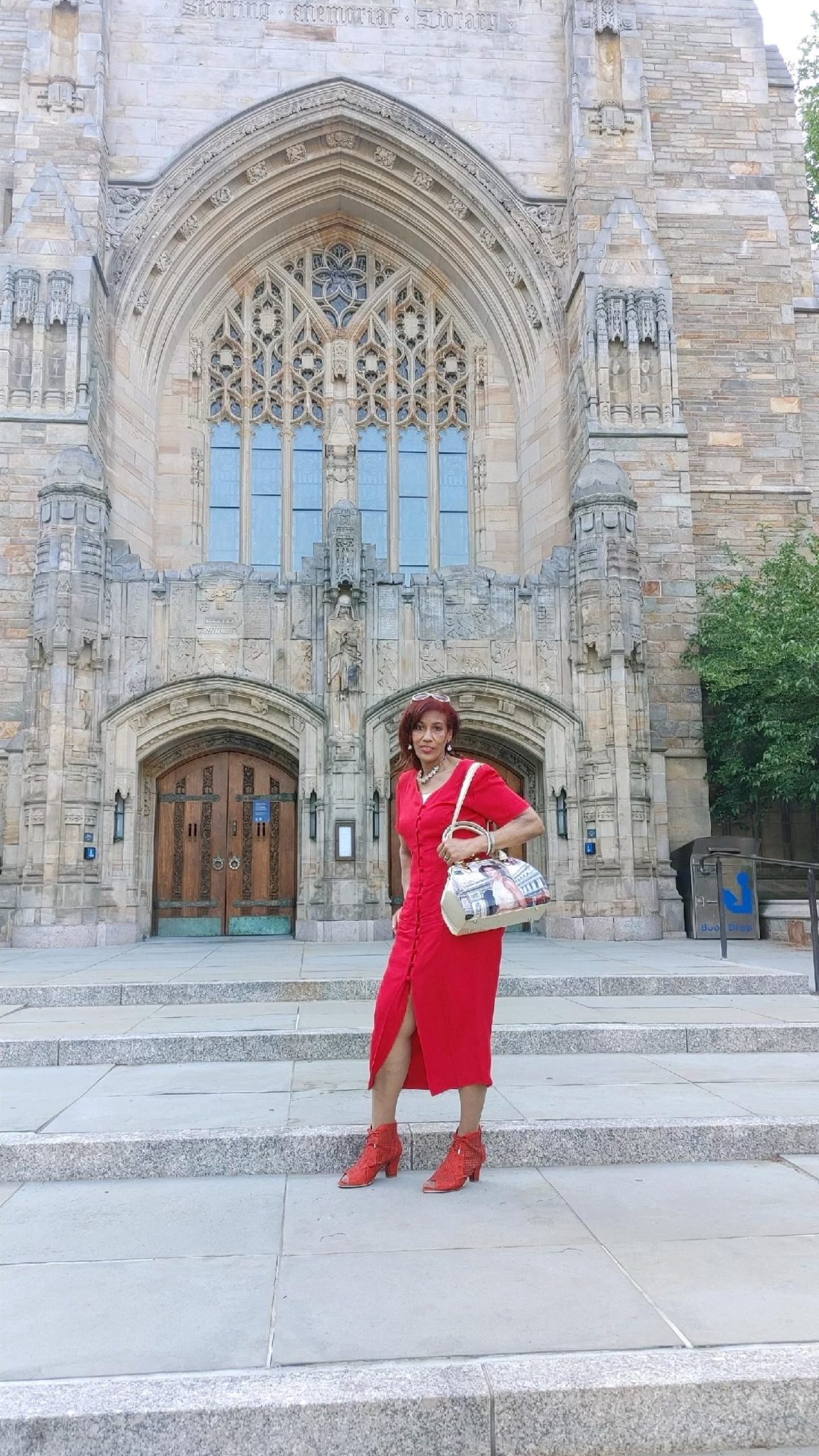
After 38 years with Yale Hospitality, Annette Tracey has come to be known as the “Queen of Berkeley” and the “Belle of Berkeley” to students old and new.
When we meet for our first interview, she comes with several manilla folders. Each one contains significant pieces of writing, including several ENGL 120 profile essays. But other essays are broader in scope, including a term paper for a political science course that details Annette’s greater involvement in the New Haven community. Every last piece is exalting in nature, even those concerned more with matters of biography. Today she has no critics, unless you count yourself as one of the disgruntled students who attempted to thwart entrance to the dining hall back when Berkeley was closed to transfers in the 2000s as a part of chef Alison Waters’ then-experimental (though now ubiquitous) sustainable food project.
But to me, a Branford sophomore who admittedly gives Berkeley little preference over the other dining halls, she is simply Annette. Oddly enough, I don’t associate Annette first with Berkeley, nor meal swipes, nor anything to do with dining services at all. Her name unequivocally deserves understated dignity, a dignity that sometimes hides behind her regular well-meaning chirps to check swipes and gallant guffaws between friendly students. At her core, Annette is an emblem of what Yale fundamentally stands for: Annette represents the power of taking pride in a dream, and seeing that dream to fruition. She is an old-school friendly face, a bright, vivacious soul that is a part of what makes Yale, Yale. As Sandra Cashion ’92 best stated, seeing Annette in Berkeley every day “was as if we had an aunt or a second mom checking in on us.”
***
“There’s a lot to know about me, you see,” Annette says as she pulls from a tote bag filled with file folders, yearbooks, newspaper clippings and photo albums. “See this, two-oh-oh-three.” “Ah, yes, ninety-three.” “Eighty-one.” She is well-acquainted with her personal history, dancing through moments in time with graceful eloquence. I secretly rejoice in her thick Jamaican accent. She doesn’t know this, but I am homesick beyond belief as I interview her. My dad still carries a slight Jamaican twang, certain “a”s drawn out and consonants slipped. She avoids patois for the most part, but every now and then “mi” replaces “I” and we are transported to the lush fields of what we both at some point considered home.
We circle around where to start; Annette is meticulous in her documentation and memory. She briefs me with the basics: the oldest of four children (all of whom are still close, she reassures me), born in northern Jamaica before moving to the outskirts of Kingston as her mother took a new job, at which point her grandmother became more of a mother figure. “She always said, when you go into the world, you have to be good to all the people in all the ways you can,” Annette shares of her grandmother. By the rapidity with which alums later respond to my comment requests, it appears she has held true to this word. The reverence she has for her grandmother is palpable, who passed away before the turn of the century.
Her phone is filled with messages from past students who consider Annette to be a lifelong friend. Wills Glasspiegel ’05 is one of those alums, now a PhD student in the African American studies department. To him, Annette is “a part of the heart and bones of the place. She’s one of the first people I visit as soon as I go back to New Haven, and she’s one of the people that makes the campus feel like home.” Current students share a similar sentiment; Kala’i Anderson ’25 shared that “Annette is a pleasure to see every day. She’s always ready with a joke and tries her best to bring a positive attitude in and around Berkeley.” Anderson adds one more descriptor: “she’s iconic.”
“Iconic” seems to come up often with regards to Annette, who began working at Yale as a part-time employee in 1981, initially rotating between Timothy Dwight, Pierson, Silliman and Grace Hopper colleges, though she’s now worked in all 14 college dining halls. She still has students from these colleges reach out to her at alumni reunions. With each alum mentioned she whips out a picture of her with them and their family, families it’s obvious she considers a part of her own. But she’s also iconic for a different reason: any time a big name came to Yale, it seems Annette was there.
One of Annette’s finest such occasions, it seems, came when former president Bill Clinton visited Yale in October 2003. In a well-loved photo she giddily shares with me, Annette stands just above the shoulder of a young Clinton, sporting a rhinestone-studded American cap, red, white and blue eyeshadow and dangly gemstone earrings. Save for her then-dark hair now dyed mahogany red, Annette looks exactly the same then as she does today. And the celebrities didn’t stop at Bill Clinton; she’s keen to share that she met former U.S. Secretary of Homeland Security Tom Ridge in 2004, as well as former secretary of state and current presidential envoy for climate John Kerry. She’s met New Jersey senator Cory Booker, as well as news journalist Barbara Walters and 2022’s Class Day speaker Rashma Saujani. Her knowledge of important Yale visits is borderline encyclopedic, especially if the visitor is an American leader. Now a naturalized citizen, it appears there are two things Annette is abundantly proud of: being American and owning a home.

Annette’s path to her American Dream is remarkably interesting. She married her husband –– a close school friend’s cousin –– in Jamaica in the spring of 1981. She brings her wedding album to show me, and though the marriage would end before the turn of the decade, a mischievous glint lights up Annette’s face when I mention how stunning I find her white wedding dress.
The core of Annette’s story, it seems, revolves around a holiday Jamaica doesn’t even celebrate: Halloween. She emigrated to America on Oct. 31, 1981, and every year a mélange of Berkeley students make her a congratulatory poster celebrating another year in America. Every year, she dresses up as “Miss Liberty” — the Statue of Liberty. There are photos upon photos of her with past students on Halloween, each of whom she remembers to a T: “ah yes, this is Max, he’s in law school now.” To Annette, her students are her children. “I get to see them grow up over the four years — it’s very rewarding,” she says.
But Annette has been at Yale far longer than the four years a majority of undergraduates will spend in New Haven. I’m not the first to write about Annette. She leaves me with three past English 120 essays centered on her story. Keneisha Sinclair ’09 writes of how Annette is “a part of Yale University even more than students are.” Angela Ning ’14 writes of Annette’s childhood preparing hot chocolate from scratch with her grandmother, a fact I didn’t know from my own interviews with her. Jeff Zhu writes of Annette’s time working in a furniture store in Kingston and the values she’s distilled from her Anglican faith. Towards the end of Zhu’s essay he concludes that students “have come to respect her deeply, both as a familiar face and as an authoritative figure.” Part of the joy of unpacking Annette’s story comes from discovering different sides to her at different points in time through these students’ writing.
At the end of Zhu’s paper, though, comes an interesting line. He writes that Annette “has also been saving money for some time now, and she hopes to buy a house near the Yale gym next year, a ‘nice house just down the street.’” This 2004 paper reveals the seedling of a momentous occasion in Annette’s life: the 2005 purchase of her own home in New Haven’s Dixwell neighborhood through the Yale Homebuyers program, an successful housing-assistance initiative pioneered by former Yale president Richard Levin.
But a line in Kate Tewksbury’s 2016 essay strikes a different chord. Kate writes of visiting Annette’s home, ruby-red and with an American flag fluttering outside. The pair listens to Bob Marley and drinks June Plum juice out of wine glasses. Tewksbury quotes Annette: “It was one of my dreams, because I had many American dreams … but that kind of house was my biggest dream. It was the biggest dream you could ever dream.”
***
I keep coming back to Annette’s grandmother. Between all the documents she hands me, the photos she sends, the alums reaching out, and of course her insistent mannerisms at the counter of the Berkeley swipe stand (I will never cut a Thundercock in the express line, that is for sure), it is difficult to imagine a demure, reserved Annette. But she is most sentimental when she speaks of her grandmother. It is clear that Annette Tracey lives and breathes the principles of this beloved woman: right, responsibility and reality. She demonstrates a genuine appreciation for her students and the individual experiences of each and every individual she interacts with, repeating that “you never know what someone else is going through.”
Annette is a breath of tropical air, a warm hug in the form of her iconic “word of the day” that she usually displays on the Berkeley check-in-counter – “phantasmagoric” and “apogee” are two favorites she pulls out for me. Amidst moments of pure chaos and exhaustion at a school that sometimes prides itself on what can be overwhelming innovation, I am grateful for the fact that Annette takes pride in things done right. Michael Morand ’87 DIV ’93 describes her as a “centurion, connector and catalyst,” but to me, Annette is simply home.







